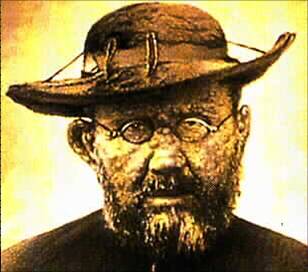The four-fold method of prayer I’m recommending here comes from Pope Benedict. In fact it is much older, dating back to the time of the Church Fathers, practiced and taught by many saints through the ages.
But Pope Benedict was the first person to make this method of personal prayer magisterial. He outlined its steps, and recommended it to all Catholics, in his post-synodal exhortation to the Church, Verbum Domini. (See paragraphs 86-87.)
The first step in praying with the scriptures is very easy, and even more intuitive. Lectio. Reading. To pray with the scriptures, you have to read the scriptures!
Lectio is a slow and focused reading. In the Internet Age, this can be quite difficult. Our reading habits are very different to medieval monks. In the monastic tradition you read slowly. Very slowly. And repeatedly. You might spend five minutes reading and re-reading one verse, ruminating on the word or phrase that jumps out of you.
For years I understood this to be the heart and soul of Lectio Divina. And I can’t do it. That way of reading is not only alien to me; it is also, quite honestly, abhorrent. So I abandoned any hope of practising Lectio Divina. I forgot one of the first principles of prayer: pray as you can, not as you ought. That principle bears repeating, and it’s well worth memorising:
Pray as you can, not as you ought.
The point of Lectio is not reading one word per minute. The point of Lectio is reading with an open heart. With the intention of receiving the Lord’s word into your heart.
“Did not our hearts burn within us while he talked to us on the road, while he opened to us the Scripture?” (Lk 24:32)
The encouraging example of St Jerome
But what if you don’t particularly enjoy reading Sacred Scripture? What if you find it tedious, and your mind wanders? You’re in good company? St Jerome, “the greatest Doctor” of the Church and father of Bible scholarship, felt the same way. In his memorable letter to Eustochius, St Jerome recalls how he moved to the Holy Land, sacrificing family, friends, food and comfort. He gave up everything to serve the Lord. Everything except his library of classical authors.
He see-sawed, making great gains in the spiritual life, then regressing in a binge of secular reading.
And so, miserable man that I was, I would fast only that I might afterwards read Cicero. After many nights spent in vigil, after floods of tears called from my inmost heart, after the recollection of my past sins, I would once more take up Plautus. And when at times I returned to my right mind, and began to read the prophets, their style seemed rude and repellent. I failed to see the light with my blinded eyes; but I attributed the fault not to them, but to the sun.
How relatable is that? “Their style seemed rude and repellant.” I’ll be honest. I’lol savour every page of a good novel by Evelyn Waugh or Graham Greene. The Bible, not so much.
But Jerome shares with us an important lesson. And a dramatic one, which involves a near-death experience:
While the old serpent was thus making me his plaything, about the middle of Lent a deep-seated fever fell upon my weakened body, and while it destroyed my rest completely — the story seems hardly credible — it so wasted my unhappy frame that scarcely anything was left of me but skin and bone. Meantime preparations for my funeral went on; my body grew gradually colder, and the warmth of life lingered only in my throbbing breast.
Suddenly I was caught up in the spirit and dragged before the judgment seat of the Judge; and here the light was so bright, and those who stood around were so radiant, that I cast myself upon the ground and did not dare to look up. Asked who and what I was I replied: “I am a Christian.”
But He who presided said: “You lie. You are a follower of Cicero and not of Christ. For ‘where your treasure is, there will your heart be also.’”
Instantly I became dumb, and amid the strokes of the lash — for He had ordered me to be scourged — I was tortured more severely still by the fire of conscience, considering with myself that verse, ‘In the grave who shall give you thanks?’
Yet for all that I began to cry and to bewail myself, saying: “Have mercy upon me, O Lord: have mercy upon me.” Amid the sound of the scourges this cry still made itself heard.
At last the bystanders, falling down before the knees of Him who presided, prayed that He would have pity on my youth, and that He would give me space to repent of my error. He might still, they urged, inflict torture on me, should I ever again read the works of the Gentiles. Under the stress of that awful moment I should have been ready to make even still larger promises than these. Accordingly I made oath and called upon His name, saying: “Lord, if ever again I possess worldly books, or if ever again I read such, I have denied You.”
Dismissed, then, on taking this oath, I returned to the upper world, and, to the surprise of all, I opened upon them eyes so drenched with tears that my distress served to convince even the incredulous . . .
I profess that my shoulders were black and blue, that I felt the bruises long after I awoke from my sleep, and that thenceforth I read the books of God with a zeal greater than I had previously given to the books of men.
The moral of this story is not that reading anything else than scripture will condemn you to Hell. Jerome had a particular vocation not shared by you and me. The moral of the story is: if you don’t have a love of Sacred Scripture, pray for it! Ask God for the grace. Ask St Jerome to pray for you.
Do not be surprised — much less discouraged — when you sit down to read the scriptures, and nothing happens. When you’re reading supernatural books, you’re engaging in a supernatural activity. You need grace, so ask for it.
St Jerome himself did not have a natural love for Sacred Scripture. There were other books he preferred. He had to through a purgation — he had to be stripped of his earthly love for earthly books — before he received a supernatural love for supernatural books. The greatest Doctor in the Church endured a radical purgatory before falling in love with the scriptures. The purgative way is a necessary step in the spiritual life. There is no holiness without the cross.
In sum: read Sacred Scriptures with an open heart, prayerfully and attentively. And ask God to help you. Here endeth the first lesson.






Recent Comments